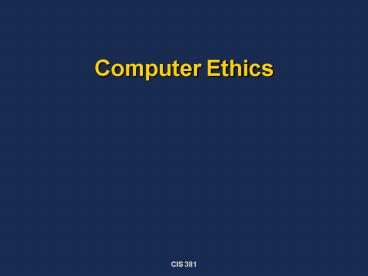Computer Ethics - PowerPoint PPT Presentation
1 / 15
Title:
Computer Ethics
Description:
... or prohibiting the free exercise thereof; or abridging the freedom ... The Internet, the Web, BBS, and online information services do not fit into one ... – PowerPoint PPT presentation
Number of Views:341
Avg rating:3.0/5.0
Title: Computer Ethics
1
Computer Ethics
2
Overview
- To frame our discussion, consider
- Why should we study computer ethics?
- What domains provide input for our
considerations? - Is computing special, or simply another
technology with regards to ethical considerations?
3
Outline
- Policy Vacuum
- Professional Responsibility
- Example
4
New Possibilities
- New technologies create new possibilities for
human action. In doing so, new technologies
present us with situations for which we must
evaluate the technology in the context of use.
5
Policies
- James Moor argues that the central task of
computer ethics is to determine what we should do
and what the policies (personal and social)
should be.
6
Policy Vacuum
- Some argue that new technologies create policy
vacuums. This lack of policy implies two things - 1) we must decide on a behavior without policy
guidance, and - 2) we are responsible to help formulate policies
for these technologies.
7
Professional Responsibility
- 1.1 Contribute to society and human well-being.
- An essential aim of computing professionals is to
minimize negative consequences of computing
systems, including threats to health and safety.
When designing or implementing systems, computing
professionals must attempt to ensure that the
products of their efforts will be used in
socially responsible ways, will meet social
needs, and will avoid harmful effects to health
and welfare.
http//www.acm.org/constitution/code.html
8
- 1.7 Respect the privacy of others.
- Computing and communication technology enables
the collection and exchange of personal
information on a scale unprecedented in the
history of civilization. Thus there is increased
potential for violating the privacy of
individuals and groups. It is the responsibility
of professionals to maintain the privacy and
integrity of data describing individuals. This
includes taking precautions to ensure the
accuracy of data, as well as protecting it from
unauthorized access or accidental disclosure to
inappropriate individuals.
http//www.acm.org/constitution/code.html
9
- 2.3 Know and respect existing laws pertaining to
professional work. - ACM members must obey existing local,
state,province, national, and international laws
unless there is a compelling ethical basis not to
do so. Policies and procedures of the
organizations in which one participates must also
be obeyed. But compliance must be balanced with
the recognition that sometimes existing laws and
rules may be immoral or inappropriate and,
therefore, must be challenged.
http//www.acm.org/constitution/code.html
10
- 2.7 Improve public understanding of computing and
its consequences. - Computing professionals have a responsibility to
share technical knowledge with the public by
encouraging understanding of computing, including
the impacts of computer systems and their
limitations. This imperative implies an
obligation to counter any false views related to
computing.
http//www.acm.org/constitution/code.html
11
Communications Paradigms
- On the Internet everyone can be a publisher. We
can "publish" whatever we wish. We are protected
by the First Amendment to the Constitution.
12
NOT
- Attempting to apply existing frameworks to new
technologies won't work. The government routinely
tries to restrict First Amendment protections
that were not explicitly mentioned in the
Constitution.
13
First Amendment
- Congress shall make no law respecting an
establishment of religion, or prohibiting the
free exercise thereof or abridging the freedom
of speech, or of the press or the right of the
people peaceably to assemble, and to petition the
government for a redress of grievances.
14
Historical
- Print Media (newspapers, books, magazines,
pamphlets) - Strongest protection. This is precisely what the
framers of the Constitution intended to protect. - Broadcast (television, radio)
- This media regulated. Standards of merit are
reviewed by the government and license renewal in
contingent on meeting that standard. - Common Carriers (telephone, telegraph, postal
system) - Provide a medium of communication, not content.
Must make their service available to everyone.
15
Notes
- The Internet, the Web, BBS, and online
information services do not fit into one of the
three paradigms. Neither did cable television.
The Supreme Court said cable operators have more
free-speech rights than broadcast but less than
print.































